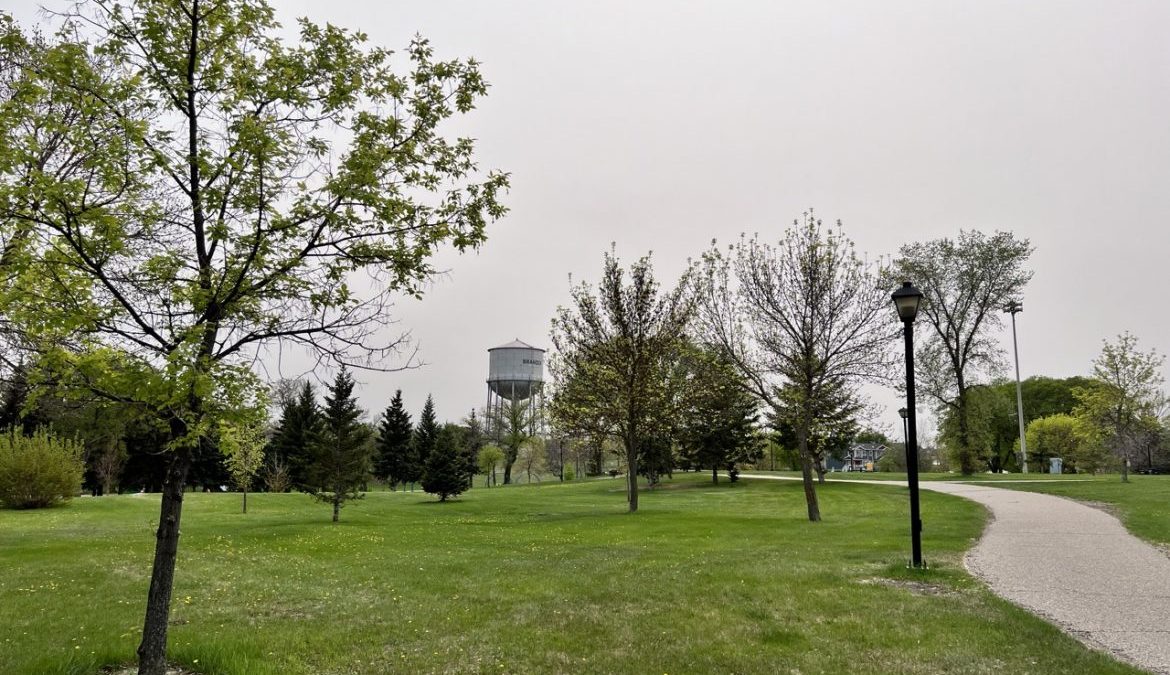A research team from Brandon is working with Brandon residents, global leaders in Copenhagen, and Canadian experts to improve public space like parks and pathways, including non-motorized ways, like walking and biking, for people to get around the city of Brandon.
The “Walking the Walk in Smaller Cities” team brings together representatives from Brandon University, the City of Brandon, and Prairie Mountain Health. They have spent the summer engaging Brandon residents through surveys and focus groups to better understand how people in Brandon use and want to use places like parks and pathways. Now they’re taking what they learned from Brandon residents to a workshop in Copenhagen, Denmark, to develop innovative solutions for making Brandon a more livable city for all with global experts.
“Although Copenhagen is different from Brandon in many ways, they face some of the same challenges as we do, but with their different history and social context, they’ve come up with unique solutions, and we think there’s lots to learn,” said BU researcher Dr. Rachel Herron. “The basic playbook for livable cities is already written: Put people first and give them choices.”
Herron is leading the research project, which also includes Grant Hamilton, BU’s Director of Marketing and Communications, Dr. Amy Frykoda, a Medical Officer of Health from Prairie Mountain Health, Ryan Nickel, the City of Brandon’s Director of Planning and Buildings, and Brandon mayor Jeff Fawcett.
They’ll join similar research teams from the cities of Saskatoon, Guelph, and Oshawa at the Copenhagen conference, which is designed and led by Toronto-based nonprofit 8 80 Cities.
Through five days in Copenhagen, the Brandon team will be exposed to the Danish example, which has transformed its public spaces and transportation networks by putting people first and giving them choices that promote the health of individuals, communities, and the planet.
“Our research this summer showed that people in Brandon enjoy public spaces, especially our parks and path system, but they want more options to use these spaces safely and connect to other parts of the city,” said Dr. Herron, adding that the insights were derived from an online anonymous survey, a social media listening campaign, and a series of intensive focus groups to ensure that all populations in Brandon had a say.
“People in Brandon have different needs and different perspectives, but there were areas of shared concern as well,” she said. “Broadly, people in Brandon are looking for places that are safe, are accessible to all, that meet their human needs, and where they can meaningfully engage with their community.”
The themes identified by the group’s summer research include many recommendations that fall under four categories:
- Safety — includes being able to walk or bike while being protected from vehicles, feeling safe downtown, and not worrying about bike theft.
- Accessibility for all — includes being able to access information about events and programming, as well as being able to conveniently and affordably move across the city, even without a car.
- Meeting human needs — includes access to washrooms and water, protection from the elements and places to rest, and access to food and drink options, including places to prepare and share food as a large group or family.
- Engagement with community — includes free events, scheduled programming, open spaces for impromptu gatherings, and interpretive signage or guidance to help connect with the land.
“As we gather with other communities from across Canada and explore what people in other countries have done so successfully, it will be essential for us to stay grounded in the Brandon experience,” Dr. Herron said.
The team departs for Copenhagen on World Car Free Day, Sept. 22, and will explore that city primarily by bike. The five-day workshop includes sessions with leading urban planners, public health officials, architects, and civic officials, as well as experiential participation in the cities of Copenhagen and nearby Malmö, Sweden.
When the team returns, they’ll reconvene the focus groups to explore different Copenhagen-inspired solutions that might fit in Brandon, and how to adapt or translate those possibilities to the Canadian prairie context.
Finally, next spring the team plans to select and implement a chosen project that’s the best fit for Brandon and will tweak it over the summer in response to real-world use. In late summer or early fall of 2024, representatives from other smaller cities in Canada will be invited to Brandon to experience this success and share this solution as widely as possible.
Contact
- Brandon University
- communications@brandonu.ca
To receive any BU publication in an alternate format please contact Communications@BrandonU.ca
About BU
Success is built at Brandon University. Our growing, progressive campus welcomes a diverse and inclusive community that combines proud tradition with shared ambition. Through our excellence in teaching, research, and scholarship, we educate students to make a meaningful difference as engaged citizens and leaders. Join us at BrandonU.ca.
